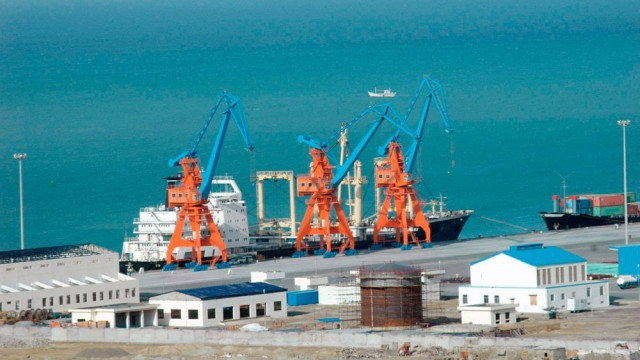Senior economist raises several questions regarding CPEC
Dr Bengali queries impact of tax exemptions to Chinese companies

PHOTO: AFP
Dr Bengali, who till recently was heading Balochistan chief minister’s Policy Reform Unit, raised 12 questions that, according to him, require satisfactory answers in order to protect Pakistan’s economic interests.
The questions encompass socially and politically sensitive topics like protection of jobs, industries, implications of CPEC on Pakistan’s balance of payments, budgetary positions and benefits Balochistan, Pakistan’s most underdeveloped province, would get out of the $55 billion umbrella deal.
CPEC: Business forum says private sector must be taken onboard
In 2013, the Chinese president made the concept of CPEC public for the first time and subsequently both the countries signed CPEC Framework agreement - which now covers projects worth $55 billion, in addition to allied benefits like construction of industrial zones. Last month, the federal government managed to address most of the concerns of the provincial governments after it made them part of development process.
The actual benefits from CPEC will depend on how the corridor is planned and executed, said Dr Bengali. “As an advisor to former CM Balochistan, I would often get questions that did not have answers,” he added.
Was an assessment conducted?
Dr Bengali has asked whether Pakistan prepared an overall CPEC feasibility before formally signing the sovereign agreement with China. He also wants an answer to the question whether CPEC Environment Impact Assessment was carried out or not.
Dr Bengali said that according to his information Pakistan did not conduct feasibility and environment impact studies, although China has conducted its own. However, officials of the Ministry of Planning said that project specific feasibility and environment studies were done.
The issue of environment has also been raised by the Giglit-Baltistan region, the gateway of CPEC, as its environment may get affected due to transit traffic that will pass through its scenic mountainous roads.
Dr Bengali has put forward questions on the shares of Pakistan and Balochistan in Gwadar port revenues. Dr Bengali is currently member National Finance Commission on behalf of Balochistan. He said that there was no clarity whether Gwadar-Khunjerab Highway will be a toll road and if so, what will be the provincial share in revenues generated by the National Highway Authority?
The planning ministry says revenue will be shared according to the existing arrangements between the centre and the federation.
Adverse impact of CPEC on local industries
One of the most important questions the economist has raised is about the positive and adverse impacts of Pakistan becoming a transit route of China on local industries. According to the existing arrangement, China is bringing goods, machinery and labour for the construction of CPEC projects. The hope that these construction activities would generate economic activities is fading away.
However, the planning ministry said that in the 6th Joint Cooperation Committee meeting both countries agreed to include nine industrial parks in the CPEC framework, which will promote manufacturing activities.
Tax exemptions offered to CPEC-related projects
Dr Bengali also raised the question about the quantum of tax exemptions to CPEC-related imports and its impacts on state revenues and the manufacturing sector. The government has already granted an income tax holiday status to Gwadar Port. It has also exempted all types of taxes on two big infrastructure projects of CPEC.
It has waived off dividend tax on the income of the Chinese financial institutions. Recently, it has waived off all types of taxes on construction and income generated by Chinese from the four mass train transit projects being built in four provincial capitals.
Rough estimates suggest, so far Rs150 billion worth tax exemptions have been given to CPEC-related projects, according to sources in the Federal Board of Revenue. These include Rs80 billion exemptions to four mass transit projects.
Dr Bengali has also asked that what will be the medium and long-term implications of the CPEC arrangement on the country’s balance of payment position and impact of foreign exchange inflows in shape of loans, foreign direct investment and outflows out flows in shape of debt repayment, profit and outward remittances.
Share of locals
So far, CPEC-related imports have adversely affected the country’s trade balance and the federal government is trying to find a way to book these loans as FDI.
CPEC benefit: MCCI chief believes country can be regional economic power
According to him, another question is; what is the budgetary burden on Pakistan for protecting Chinese roads and sea convoys. This is a very critical point, as the federal government is demanding the four provinces to give away 3% of their divisible pool for security purposes.
Dr Bengali also asked about the jobs for locals in the security units, being raised for CPEC-related protection, recruited from districts through which the Gwadar-Khunjerab Highway passes. The planning ministry has said that many projects have been initiated in Gwadar to make the locals part of the development activity.
He also wants answers to the question regarding water provision plan for Gwadar and the plan to ensure that Gwadar does not become a Baloch minority city.
Published in The Express Tribune, January 13th, 2017.
Like Business on Facebook, follow @TribuneBiz on Twitter to stay informed and join in the conversation.



















COMMENTS
Comments are moderated and generally will be posted if they are on-topic and not abusive.
For more information, please see our Comments FAQ